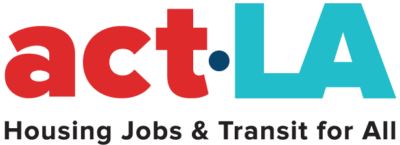Getting Serious About Safety on Metro
by Marissa Ayala
Worldwide, the safest public transportation systems are thriving, widely-used systems. In LA, Metro ridership and system safety are recovering from the pandemic. Ridership is up and violent incidents are down, but sustained improvement is needed, especially with ridership.
Unfortunately, several high profile media stories focused on tragic incidents have driven the Metro Board to ramp up police funding (in the form of contracts with Los Angeles Police Department, Long Beach Police Department, and LA County Sheriff) and increase the deployment and presence of police officers through a ‘policing surge.’ This focus on policing has dominated conversations about safety at the Metro Board, in spite of the reality that violent crime like assaults or robberies are very uncommon on the system, and driving in LA County continues to be dramatically more dangerous than using public transit, with over 300 people dying by car collisions each year — a number higher than both pre-pandemic car deaths, and higher than total homicides in Los Angeles. Meanwhile, the real crises on Metro, of substance abuse, mental health crises, and homelessness surge onward with few resources to address them.
In fact, at a June 2024 Metro Board meeting, a police department representative concluded that crimes on the system are lower than what we would expect if crimes on the system mirrored those of their surrounding municipality. Meanwhile, an internal audit of Metro’s policing contracts found little oversight, that few safety incidents were handled by contracted patrol officers, and that most contracted sheriffs were assigned to cars, and rarely found on board the system.
It’s time to put our dollars toward programs that actually work. The Metro Ambassador program in particular has shown success even in its early days, and merits further investment. ACT-LA is advocating for robust funding to the following two program areas:
Double the Ambassador Program
Metro Ambassadors — the unarmed Metro workers who offer riders hospitality, navigation help and connections to social services — have a proven record providing the positive safety presence that riders need. A strong majority of Metro riders surveyed say they feel safer in the presence of ambassadors, and ambassadors have saved over 70 lives on Metro in the past year. The success of the program is even more remarkable when considering their current budget ($40 million) is a small fraction of the police budget, and that they are contracted workers with low pay.
We support integrating Ambassadors within the new Community Safety Department and recommend doubling the number of ambassadors and expanding their coverage to buses. Additionally, Metro funds should be used to strengthen the ambassador career trajectory by increasing ambassadors’ pay and providing ongoing training, support systems and professional development opportunities. Currently, the average annual compensation for a Metro Transit Ambassador is under half of the average LAPD officer.
Dramatically Increase Mental Health and Outreach Budget
According to customer surveys and testimony, the most frequent category of safety incidents are ‘quality of life’ issues, borne of Los Angeles’ housing crisis and shortage of mental health and addiction resources. These issues aren’t resolved through policing, but due to Metro’s uneven allocation of safety dollars, police are frequently deployed in response all the same. The job of police officers is to restrain, cite and arrest people, not to connect an unhoused person or opioid user to the resources or support services they need.
Metro dedicates resources, contracting social service providers including People Assisting the Homeless (PATH) and the Los Angeles County Department of Health Services (DHS), to connect riders to mental health and housing services. While Metro estimates that around 800 unhoused people ride the system nightly, there are currently only funds to provide about 150 shelter beds. Current practitioners on the system do good work, and their programs need to be brought to scale in order to see real results.
Ultimately, we can improve the feeling of safety on the Metro system through an ‘eyes on the street’ approach that prioritizes bringing more ridership to the system, and deploying experts with specified roles like mental health and substance abuse outreach workers, and transit ambassadors.
Marissa Ayala is the Advocacy Manager at ACT-LA.
